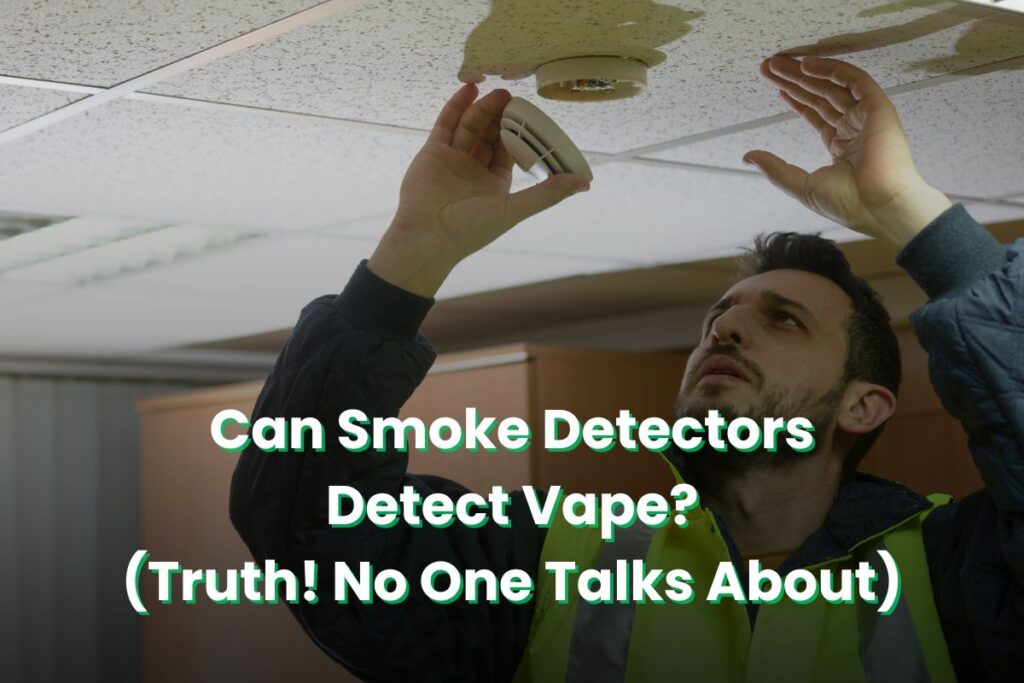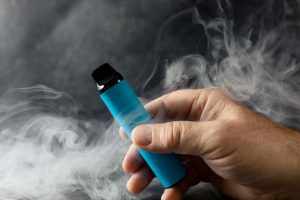
I think many of you have had the unpleasant incident of accidentally triggering a smoke detector while vaping. I mean, you were not producing smoke, right? That must have baffled your mind: can smoke detectors detect vape?
Yes, smoke detectors can actually detect vape when blown straight into them, although it is not smoke. However, modern smoke detectors have higher sensitivity than old ones, as it is prohibited to smoke indoors in most public spaces today. Depending on the type of smoke detector and the amount of vapor, it is more likely to happen in enclosed areas (e.g., airplanes and hotel rooms).
There will be more about it, particularly shedding light on the smoke detectors’ mechanisms. Keep reading.
Can Smoke Detectors Detect Vape?
Smoke detectors are safety devices designed to detect smoke and send a warning to a building’s people about the possibility of a fire accident. Now, generally, it should have been about cigarettes only because they produce smoke. However, some abrupt incidents have made vapers wonder whether e-cigarettes can also trigger a smoke detector.
The thing is, smoke detectors sense when there are airborne particles of smoke and set off an alarm when their concentration goes beyond a particular level. That said, sometimes dust, kitchen smoke, steam, and vapor can trigger a smoke alarm, too. It is mostly because of the sophistication of today’s smoke alarms. They are more sensitive to airborne particles and can send an alert in the presence of vapor.
Plus, how you blow the vape also matters. If you do it directly into the detector or somewhere close to it, it will sense the vapor and set off.
Additionally, the amount of vapor is another factor. The larger it is, the higher the likelihood of activating a smoke alarm. So, the usual recommendation is to stay safe and not vape in enclosed public places equipped with smoke detectors.
What Are The Commonly Used Smoke Detectors?
Now, not every smoke detector is equally capable of detecting vape. Let’s discuss the commonly used ones to understand their mechanisms.
Ionization Alarms
It is the most widely used smoke detector, and it works by sensing changes or fluctuations in conductivity. If a fire takes place and its smoke enters this device, its electrical current inside will be disrupted by the airborne smoke particles. Consequently, it will trigger the detector.
An ionization alarm is mainly responsive to fast-flaming fires. I cannot guarantee that it can sense vapor. However, understand that its design can definitely enable it to do that. It is better to stay aware if you want to vape anywhere around it.
Optical Or Photoelectric Alarms
An optical alarm stands next to an ionization alarm in terms of its likelihood and capability to sense vapor. It uses infrared light to detect smoke. The light activates the detector when smoke particles agitate it.
Such alarms are particularly suitable for sensing the smoke that slow-burning fires generate. They generally respond significantly faster than ionization alarms.
Dual-Sensor Smoke Alarms
These are the best of the two worlds, combining both technologies of ionization and optical alarms to strengthen their detectability. They are the most likely to sense vape.
Heat Alarms
Although not very common, heat alarms are often used in kitchens. Their key function is to detect high temperatures or set a specific temperature range that sets off the detector when that range is exceeded. They have the least likelihood of detecting vapor because they are specifically designed to respond to smoke.
Does Vaping Set Off The Smoke Alarms At Hotels?
Answering this in a straight yes or no is difficult because it is solely up to the hotel and its smoke alarm type. For example, if you see a heat alarm, as I have just discussed, it should not be a problem.
But if the hotel has an optical, ionization, or worse, dual-sensor smoke alarm, you might be in trouble for vaping. In that case, you should go to the hotel reception and ask about their vaping policies.
What Are The Vaping Rules To Maintain In A Hotel?
Many hotels strongly prohibit smoking, but their vaping rules are often vague. Some are strict about it, while some approve of vaping in their designated smoking zones.
Therefore, before taking your vaping stuff out of your luggage and taking a few puffs inside your room, you should check and be sure that it will not cause you unwanted consequences, like paying huge fines.
Some hotels reserve additional rooms for smoking where smokers or vapers can smoke or vape without worry. But if your hotel does not have that facility, see if you can get a room with a balcony. Otherwise, look for outdoor areas that allow vaping and smoking.
But what if you could covertly vape in your room? Maybe it would not activate the smoke detector, and you would get away just fine! But before you contemplate that, note that the staff and other visitors can see the vapor or get a whiff of its smell. That could put you in embarrassing situations, too.
Again, choose the safest option and keep from using your vape in prohibited places.
Does Vaping Set Off The Smoke Alarms On Airplanes?
Yes, it might, and that is why the entire aviation industry strictly prohibits smoking and vaping on each and every commercial flight. The key reason is that vapor could set off an airplane’s smoke alarms, resulting in unnecessary alerts or an emergency landing.
However, you can still bring your vape on an airplane, but you must keep it in your carry-on or cabin.
Does Vaping Set Off The Smoke Alarms At Hospitals?
Yes, depending on the smoke alarm type, vaping could set it off at hospitals. But that is a secondary concern because most hospitals follow no-smoking policies to protect their employees’ and patients’ health. They also do not permit using e-cigarettes in and around their properties.
Besides, there have been concerns regarding the effects of secondhand vaping on people with breathing issues. So, as a visitor or patient, you must entirely refrain from smoking and vaping.
Should I Turn Off A Smoke Alarm Before Vaping?
Never! A smoke alarm is installed to keep people safe. If you turn it off, you could put them at risk if something goes wrong after you turn it off.
If you must vape but are not sure if it will activate the alarm, go outside. That way, there is no need to worry about the smoke alarm or the safety of people. Plus, remember it could be illegal and make you face penalties.
How Do I Vape Without Triggering A Smoke Detector?
Using A Low-Powered Vaping Device
Using a low-powered vape pen or modifying your current vape pen’s settings will help you lower the vapor amount and decrease the chances of activating the detector.
Disposable vapes, pod vapes, and rechargeable disposable vapes are low-powered devices you can use in hotels. Switch to them when needed.
Ensuring Adequate Ventilation
A well-ventilated area will dissipate the produced vapor quickly and lower the odds of waking up the alarm. So, ensure your vaping place has adequate ventilation by opening windows or using a fan. That also means you should avoid small and tight areas to vape.
Getting Vaporless E-Juice
There is vaporless e-juice in the market. It provides the feeling of vaping without generating any vapor. It is an effective way to vape without setting off a smoke detector.
Using An Air Or Smoke Filter
Buy an air filter that will catch vapor and stop it from entering and triggering a smoke alarm. You will also find smoke filters designed to capture smoke. It will also capture vapor.
Such filters have a mechanism combining filtration as well as absorption to catch the airborne vapor and save you from setting off a smoke detector.
Choosing A Low VG E-Juice
The main ingredients of your e-Juice are propylene glycol (PG) and vegetable glycerine (VG). The latter generates a denser vapor cloud than the former. So, choosing a low VG (and high PG) e-juice will produce less vapor and lower the possibility of activating a smoke detector.
Is There Any Alternative To Vaping When It Is Not Allowed?
When vaping is not allowed in a specific place, you could try some alternatives. For example, nicotine pouches contain tobacco-free nicotine. They will fulfill your craving by delivering the nicotine but will not produce vapor. Other options are nicotine gums and lozenges to calm your nicotine triggers without using vape.
Conclusion
So, can smoke detectors detect vape? Considering their types, there is a good chance they can. Factors like the area and vapor amount also matter. However, the smart option is to avoid vaping in enclosed public spaces, especially if it is an airplane, hotel, or hospital. And where it is not allowed at all, go out and vape in the fresh air.
Finally, if you are unsure and want to vape without setting off the alarm, follow my tips. But an even better tip is to go for the alternatives instead.




